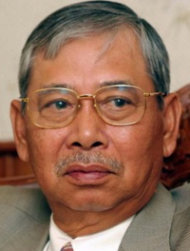'Instant citizens' may include subversives, RCI told
 Malaysiakini – 1 hour 44 minutes ago
Malaysiakini – 1 hour 44 minutes agot
The police Special Branch said today there could be
subversive elements among the foreigners who received blue identity
cards illegally and therefore Project IC was a threat to national
security.
"We do not know where these people came from or their backgrounds.
They could be criminals or subversive in nature or similar things."This becomes a threat, not only to security, but also to political, economic and social stability," assessment officer Ahmad Fauzan Mohd told the royal commission of inquiry on immigrants in Sabah today.
Ahmad, who is based in the security and human trafficking syndicate division of the Kuala Lumpur Special Branch, said he was tasked with assessing intelligence during the crackdown on Project IC.
Having led the intelligence component of the six-year investigation beginning in 1995, Ahmad said, they detected a syndicate that was illegally issuing identity cards, which was also involved in human trafficking.
As a result, he said, 94 people who were involved in the syndicate were arrested under the Internal Security Act between 1995 to 2001.
Of this, 80 were given a two-year detention under the act, six was placed under restricted residence and eight more were freed unconditionally.
Ahmad added that the detention order was signed by the then deputy home minister Megat Junid Megat Ayub ( right ).
Asked why none of these individuals were charged after being released from ISA, Ahmad explained this was the norm for all cases.
However, he said, 3,035 people who were beneficiaries of fraudulent identity cards had been charged in court with possessing the documents.
Ahmad added that from the intelligence assessed, the syndicate was driven by monetary gain valued at more than RM11 million.
"Each client (foreigner) was charged between RM50 and RM1,400... They included, agents, sub-agents as well as National Registration Department (NRD) officers," he said
'Other motives not considered'
However, when pressed if he had considered whether the syndicate had other motives, he replied: "I had no reason to look at other motives because the monetary gain (motive) is already there."
Pressed if this meant his research was only "one-track", he replied: "Yes".
Ahmad said the topmost officials involved and subsequently arrested were former Sabah NRD directors Abdul Rauf Sani and Ramli Kamarudin.
Queried by watching brief lawyer Ansari Abdullah whether politicians were among those arrested, Ahmad said he he merely assessed their activities and did not take note of their political affiliations.
The questioning was led by conducting officer Manoj Kurup.
Also taking the stand today was NRD information technology assistant director Laila Abdul Wajid, who explained that the NRD data was linked to the Election Commission through the Agency Linked-Up System.
Aside from this, Laila explained, the EC also periodically sent the names of its registered voters, in bulk, to the NRD for vetting.
"There was also a full vetting of the entire electoral roll of 11.8 million voters (by NRD) in 2011," she said.
Every month, she said, the NRD would send an average of 8,000 to 10,000 names of those who were above the age of 21, as well as names of citizens who have died, to the EC for the electoral roll to be updated.
Laila added that 66,682 people had been granted citizenship in Sabah between 1963 and October 2012. Of this, 59,276 are still alive.

No comments:
Post a Comment